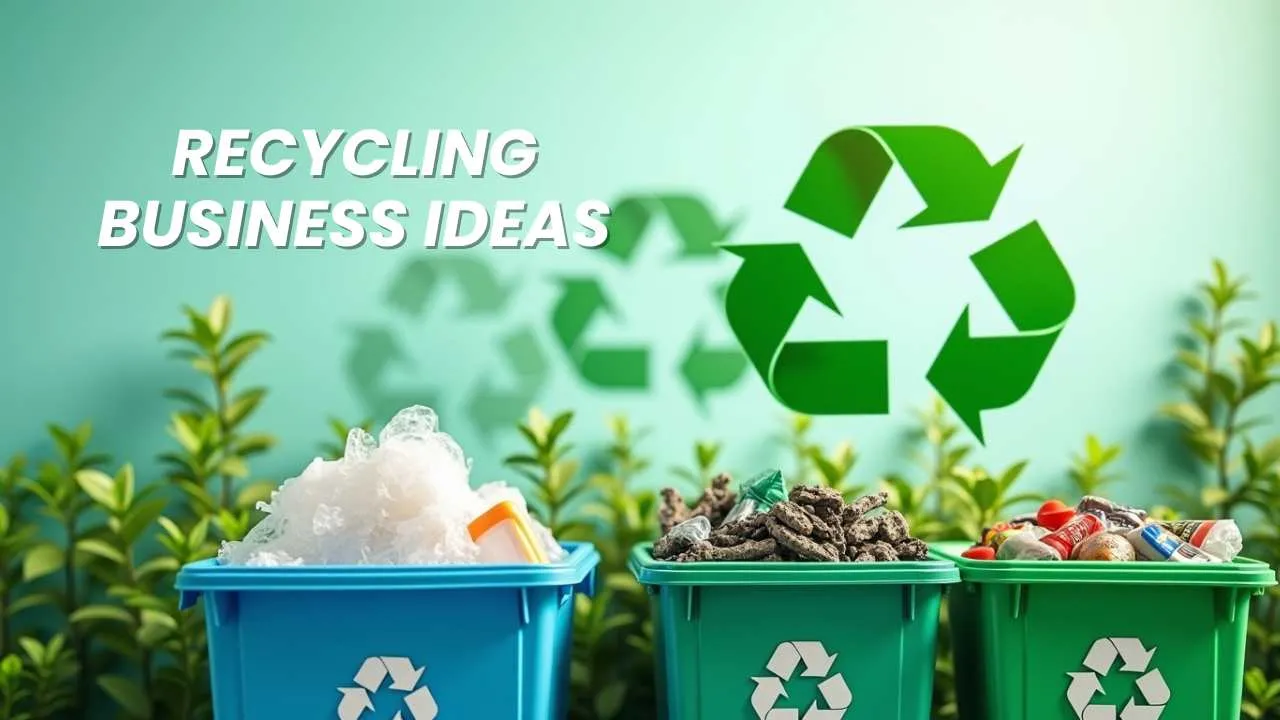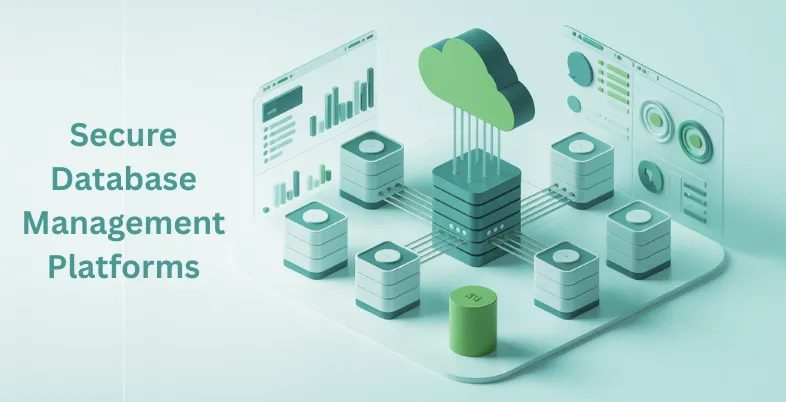The recycling companies are gaining momentum in India because the country is quite sensitive to its surroundings by the year 2025. In its annual production, over 62 million tons are squandered by the government. By the year 2030, the recycling industry can reach 1.34 b billion with a growth rate of 8.53 per annum. Plastic waste has increased to 10.9 million tons, and e-waste has reached 1.751 million tonnes, 73 percent higher in five years.
Because of this, many good recycling business ideas exist. There are excellent opportunities for recycling companies to have success due to the Extended Producer Responsibility program by the government and more people who are concerned with the planet.
Growing Need for Sustainable Practices and Recycling in India
The necessity for good approaches to waste management in India is becoming increasingly urgent. This opens up a lot of money‑making recycling business ideas for smart entrepreneurs. Currently, individuals generate 0.34kg of waste daily, and this is projected to reach 0.7kg daily in 2025. That will position India as one of the largest waste producers in the world. People are concerned about the environment, and the recycling of plastic is increasing 9.37 percent per year, as the government demands secure disposal.
India is the third-largest e-waste producer on earth, producing approximately 2million tons annually, with a global rate of increase of 163%. This demonstrates the urgency of new recycling ideas. Its waste market is estimated at $13.51 billion in 2025, with a possibility of reaching up to $27.90 billion in 2034.
The rapid growth provides excellent opportunities for entrepreneurs to establish prosperous recycling businesses, as well as contribute to environmental sustainability and the achievement of sustainable development objectives nationwide.
Why Start a Recycling Business in India?
The Indian market creates enormous opportunities for companies that recycle since the government has favorable policies, more people are interested in the environment, and there is a lot of waste in cities and villages.
- Market Demand: There are more environmentally-conscious people who will continue to purchase recycled products. This provides the businesses with a stable revenue.
- Government Support: Rules that hold the producers accountable for waste and other waste-management policies assist the recyclers. They provide financial and legal assistance.
- Low Competition: There are numerous underserved recycling areas. This makes first movers have an edge on new recycling concepts for other types of waste.
- Social Impact: Recycling benefits the world and generates income. It makes the business have a good purpose, and it wins the favor of the community.
- Scalability Potential Scale up to local operation and continue to larger markets according to the knowledge gained.
8 Most Profitable Recycling Business Ideas in India
1. E-Waste Recycling
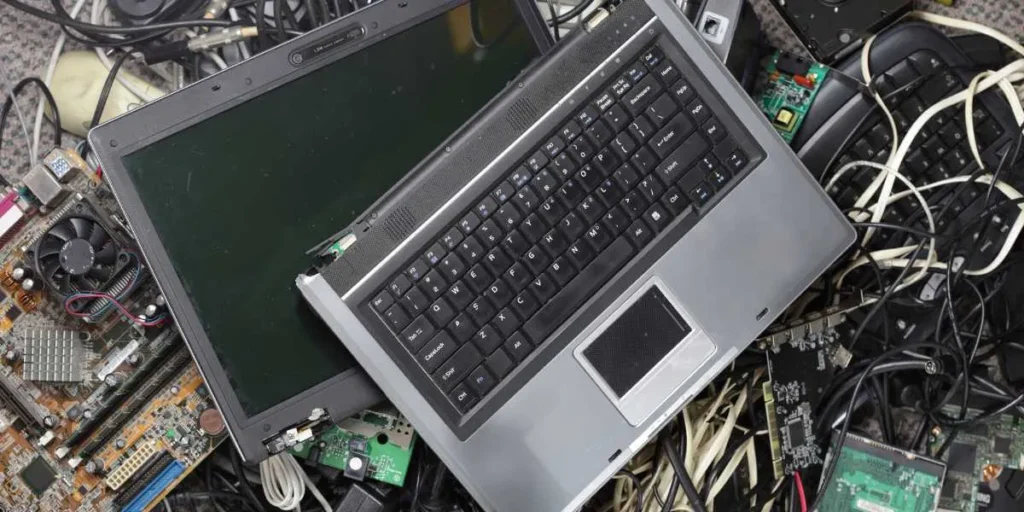
E-waste recycling is a profitable recycling business that is good. Now the market is estimated to be approximately worth 1.6 billion dollars in 2024, but is likely to grow at an estimated annual rate of 6.6 percent up to 2033. India disposes of 1.751 million tons of e-waste annually, meaning there is plenty to be collected. Phones, computers, TVs, and other old appliances are picked, disassembled, and left with useful parts. The metals that the business handles include gold, silver, copper, rare earths, and hazardous parts. This is only possible with a government certificate on plants, and hence, small people find it challenging, while big corporations enjoy it.
Target Market: IT companies, households, government offices
Startup Requirements:
- Processing facility: ₹15-25 lakhs
- Collection vehicles: ₹5-8 lakhs
- Safety equipment: ₹2-3 lakhs
- Licenses permits: ₹1-2 lakhs
- Working capital: ₹5-10 lakhs
Profit Potential: 25-35% margin
Challenges/Risks:
- High initial investment
- Complex regulatory compliance
- Technical expertise required
- Hazardous material handling
- Collection network development
- Market price volatility
Tips for Success:
- Obtain proper certifications
- Build corporate partnerships
- Invest safety training
- Develop collection network
- Focus quality processing
2. Plastic Recycling
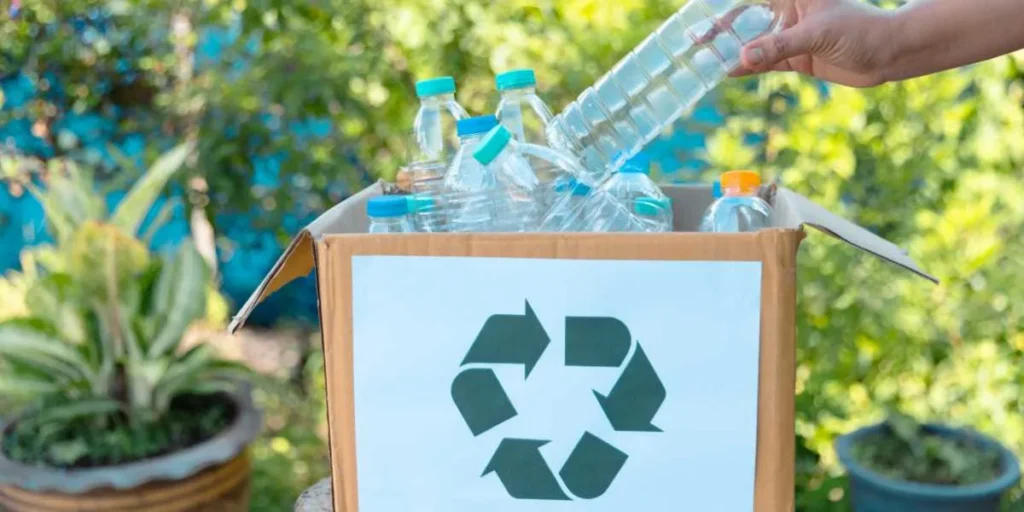
Another opportunity is recycling of plastic. By 2024, the market will reach about $4.1 billion, and the market growth will be up 10.8 percent annually over the next five years. PET bottles and HDPE packages and other plastic waste are converted into reusable or second products through PET or HDPE pellets. By 2030, India has a potential of 18.8 million tonnes of possible recycling. This is achieved through collection, sorting, cleaning, shredding into pellets, and the sale of the plastic to plants. Recycling plastic is one of the most promising eco-friendly business ideas, as packaging, textile, and car manufacturers are in strong demand; therefore, the market remains stable.
Target Market: Manufacturing companies, the packaging industry, households
Startup Requirements:
- Processing machinery: ₹10-18 lakhs
- Factory space: ₹3-5 lakhs
- Raw material: ₹2-4 lakhs
- Transportation: ₹3-5 lakhs
- Working capital: ₹5-8 lakhs
Profit Potential: 20-30% margin
Challenges/Risks:
- Raw material quality
- Market price fluctuations
- Collection logistics challenges
- Environmental compliance costs
- Competition from imports
- Technology upgradation needs
Tips for Success:
- Focus quality sorting
- Develop supplier network
- Maintain consistent quality
- Build buyer relationships
- Invest modern machinery
3. Metal Recycling
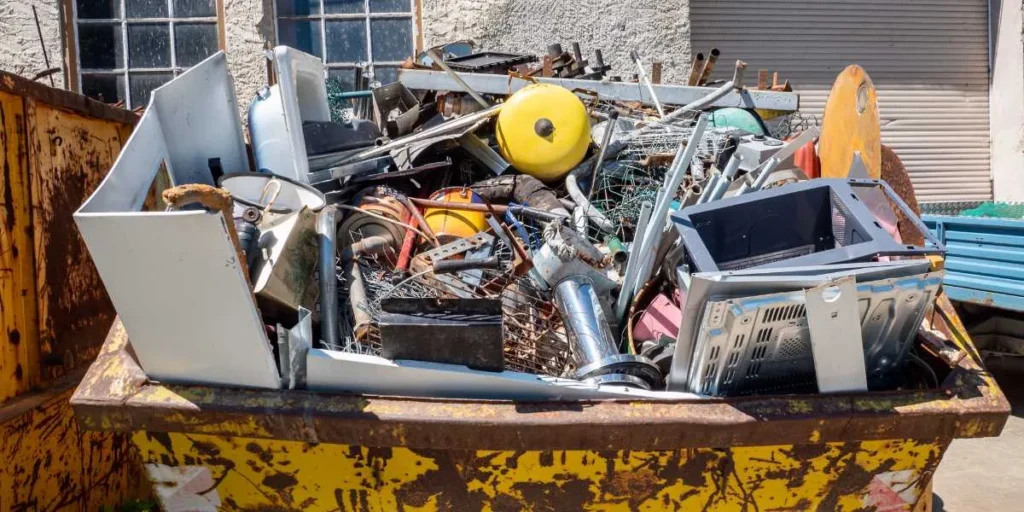
The trading in metal scrap is lucrative. It touches on the steel (ferrous) and non-steel (non-ferrous), which are products of demolition, former cars, and industrial scraps. The scrap is gathered by the shop, sorted and cleaned and sold to steel mills and foundries. The car and construction industry in India generates a fair amount of metal waste, and thus availability is never really in fashion. Demand is always the same, and prices are high, giving good margins. State-of-the-art sorting machines and a convenient place facilitate profit.
Target Market: Construction sites, automotive industry, manufacturing units
Startup Requirements:
- Sorting equipment: ₹8-15 lakhs
- Weighing scales: ₹1-2 lakhs
- Storage facility: ₹5-8 lakhs
- Transportation: ₹4-6 lakhs
- Working capital: ₹10-15 lakhs
Profit Potential: 15-25% margin
Challenges/Risks:
- High investment requirements
- Price volatility issues
- Quality assessment difficulties
- Transportation costs high
- Regulatory compliance needs
- Storage space requirements
Tips for Success:
- Learn price trends
- Build supplier relationships
- Invest quality testing
- Optimize transportation routes
- Maintain proper records
4. Paper Recycling
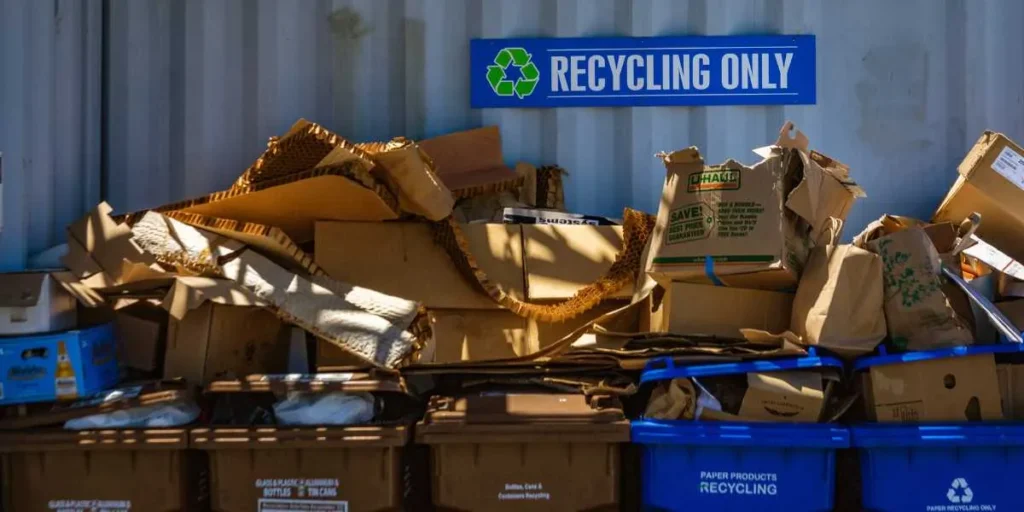
Recycling of papers can be initiated very easily. Paper, offices, schools, newspapers, and online shopping generate plenty of cardboard. The company takes waste paper and sorts it, then renders it into pulp before washing and then recycling it into another paper. Start-up costs are low, and the desire is never lacking.
Target Market: Printing companies, packaging industry, paper mills
Startup Requirements:
- Processing machinery: ₹5-10 lakhs
- Collection vehicles: ₹3-5 lakhs
- Storage space: ₹2-3 lakhs
- Working capital: ₹3-5 lakhs
- Permits licenses: ₹50,000-1 lakh
Profit Potential: 12-20% margin
Challenges/Risks:
- Low profit margins
- Quality control issues
- Seasonal demand fluctuations
- Collection network development
- Competition from imports
- Raw material contamination
Tips for Success:
- Focus grade separation
- Build collection network
- Maintain quality standards
- Develop buyer relationships
- Optimize operational costs
5. Glass Recycling

Bottles and containers (drinks, medicine, and food) are transformed into new glass during the process of glass recycling. The procedure is to gather the objects, sort them depending on color, wash, prepare, and melt the glass. The beverage and packaging business of Heartland generates a considerable quantity of glass, allowing for a lot of material. Glass recycling is a profitable recycling business, but it needs special machines and consumes less energy than the extraction of glass using raw stone. The company maintains its stock through deals with beverage manufacturers and bars.
Target Market: Beverage companies, restaurants, glass manufacturers
Startup Requirements:
- Crushing equipment: ₹6-12 lakhs
- Sorting machinery: ₹3-5 lakhs
- Transportation: ₹3-4 lakhs
- Storage facility: ₹2-3 lakhs
- Working capital: ₹4-6 lakhs
Profit Potential: 18-28% margin
Challenges/Risks:
- Breakage handling issues
- Color sorting challenges
- Transportation safety concerns
- Limited local demand
- Equipment maintenance costs
- Quality specification requirements
Tips for Success:
- Develop color sorting
- Build industry partnerships
- Invest safety measures
- Focus quality control
- Optimize logistics network
6. Textile Recycling

Recycling of textile involves the process of collected used clothes, factory scrap and household textiles and changing them into new products of fibres. India manufactures a large quantity of reusable clothes. The process gathers the items, sorts them according to the material and utilises machines or chemical in creating more fibres, yarns or other products such as carpet and insulation. The market continues to expand due to the fact that individuals are fed up with fast fashion and would prefer recycled fabric.
Target Market: Garment manufacturers, fashion brands, households
Startup Requirements:
- Processing equipment: ₹4-8 lakhs
- Collection network: ₹2-3 lakhs
- Storage facility: ₹1-2 lakhs
- Working capital: ₹3-5 lakhs
- Permits: ₹25,000-50,000
Profit Potential: 15-25% margin
Challenges/Risks:
- Mixed fabric separation
- Quality control difficulties
- Market awareness low
- Seasonal supply variations
- Processing complexity high
- Limited technology availability
Tips for Success:
- Focus fabric sorting
- Build manufacturer partnerships
- Develop quality processes
- Create awareness campaigns
- Invest sorting technology
7. Organic Waste Composting
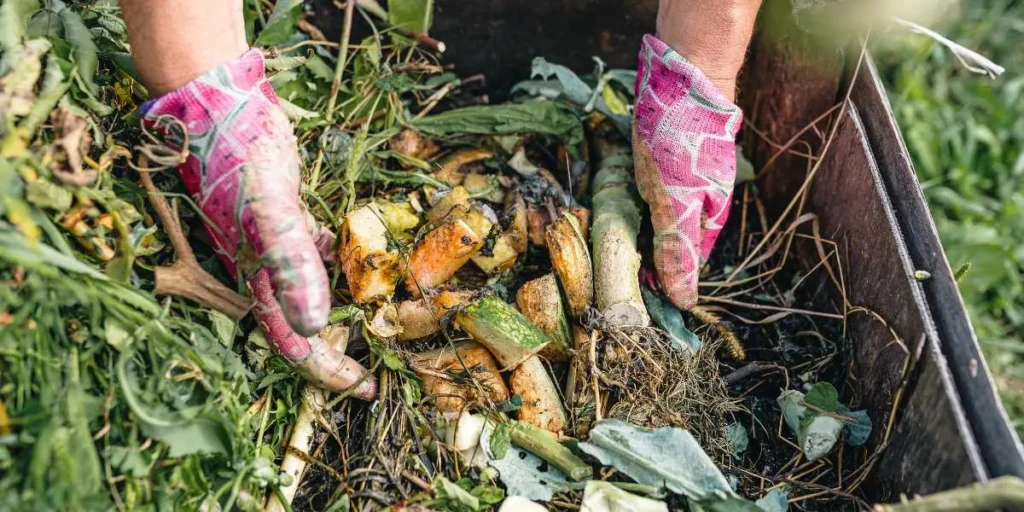
Composting organic waste will transform kitchen scraps, garden waste, and farm rubbish into helpful farm compost. Millions of tons of organic matter that India discards annually are utilized as compost, thus decreasing garbage and also serving as fertilizer to farmers. The waste collected by the business is decomposed in vermicompost or aerobic composting processes, and packaged as the finished fertilizer, which is then sold. Composting is one of the most promising eco-friendly business ideas, as demand is projected to increase with more farmers adopting chemical-free and organic farming techniques.
Target Market: Farmers, organic agriculture, gardening enthusiasts
Startup Requirements:
- Composting setup: ₹2-5 lakhs
- Collection system: ₹1-2 lakhs
- Land rental: ₹1-3 lakhs annually
- Equipment tools: ₹50,000-1 lakh
- Working capital: ₹2-3 lakhs
Profit Potential: 20-35% margin
Challenges/Risks:
- Seasonal demand fluctuations
- Odor management issues
- Space requirements large
- Processing time lengthy
- Quality consistency challenges
- Market education needed
Tips for Success:
- Maintain proper ratios
- Control moisture temperature
- Build farmer networks
- Ensure quality testing
- Develop brand reputation
8. Clothes & Textile Reuse
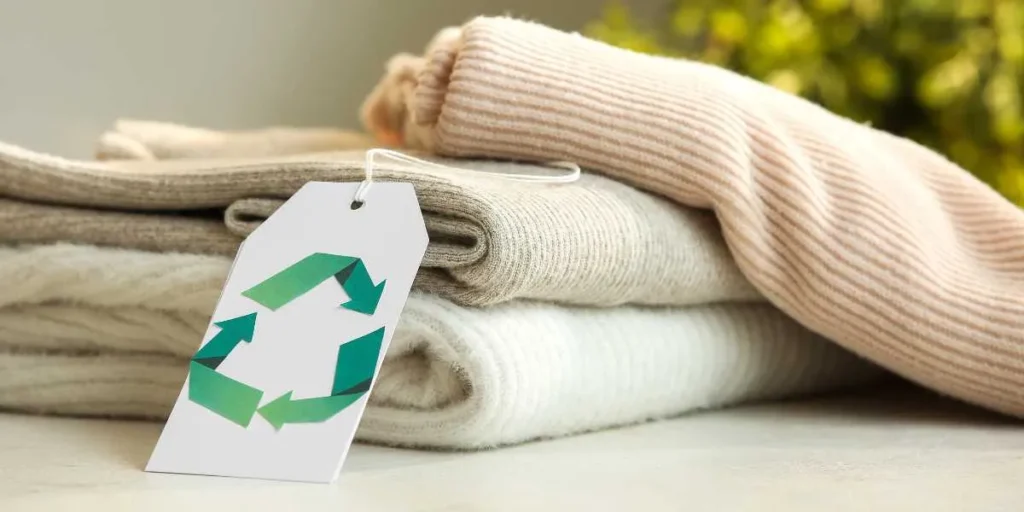
The re-usage of clothes has been innovative, where old clothes are repaired or upgraded and marketed at reduced prices. This will fit the pattern of environmentally friendly fashions and offer cheaper clothes. The work will involve sorting clean used clothes, laundry, repairing where necessary, and offering them in shops, through the internet, or even having them shipped in bulk. India has numerous customers who are fashion-crazed and turning greener. The profitability of vintage stores, second-hand clothing online intermediaries, and the global export of used clothes makes it a lucrative idea.
Also Read: Clothing Business Ideas
Target Market: Fashion-conscious consumers, budget buyers, export markets
Startup Requirements:
- Retail space: ₹2-4 lakhs
- Collection network: ₹1-2 lakhs
- Sorting equipment: ₹50,000-1 lakh
- Cleaning setup: ₹1-2 lakhs
- Working capital: ₹2-3 lakhs
Profit Potential: 30-50% margin
Challenges/Risks:
- Brand perception issues
- Quality assessment challenges
- Seasonal demand patterns
- Storage space requirements
- Marketing awareness needs
- Competition from new clothing
Tips for Success:
- Focus quality curation
- Build brand reputation
- Develop online presence
- Create attractive displays
- Maintain hygiene standards
How to Start a Recycling Business in India
The beginnings of a successful recycling business require proper planning and clarity in the understanding of rules. That training is significant to those wishing to begin recycling companies in the expanding green market of India.
- Research: Take a close look at the market to know which streams of waste may be in a position to make money, the amount of competition available, and what people in the immediate areas require of recycled goods.
- Licensing: Obtain authorization papers that are required, such as pollution control permits, trade clearance, and waste-management charges from the appropriate government bodies.
- Infrastructure: Establish processing facilities, which are equipped and have the necessary machines and other storage and transport facilities of the recycling business you intend to establish.
- Partnerships: Develop good relationships with waste-producing companies, people who get them, and consumers who purchase final goods that are made out of the waste, so that the supply and demand curves remain continuous.
- Operation: The system runs in a manner in which the collection, processing, and quality tests are conducted properly with constant observation of the environmental regulations as well as safety regulations.
Recycling Business Profit Margins in India (2025)
| Business Type | Profit Margin | Investment Range | Payback Period | Market Demand |
| E-Waste Recycling | 25-35% | ₹25-50 lakhs | 2-3 years | Very High |
| Plastic Recycling | 20-30% | ₹20-40 lakhs | 2-4 years | High |
| Metal Recycling | 15-25% | ₹25-45 lakhs | 1-2 years | High |
| Glass Recycling | 18-28% | ₹15-25 lakhs | 2-3 years | Medium |
| Textile Recycling | 15-25% | ₹8-15 lakhs | 1-2 years | Medium |
| Paper Recycling | 12-20% | ₹8-18 lakhs | 2-3 years | High |
| Organic Composting | 20-35% | ₹5-12 lakhs | 1-2 years | High |
| Clothes Reuse | 30-50% | ₹6-12 lakhs | 1-2 years | Medium |
Benefits of Starting a Recycling Business
The recycling business provides numerous opportunities to businesspeople seeking lucrative and environmentally friendly business projects that endure and serve humanity, particularly in India, where waste management is evolving rapidly.
- Environment: decreased waste and conservation of resources is beneficial to the planet and creates long-term businesses.
- State Assistance: Government policies and assistance, such as subsidies, enable recycling companies to run more easily and have a decent chance against the market.
- Market Development: The population is more concerned with the environment and creates increased waste, thus creating consistent demand of various recycling companies.
- Social Responsibility: Providing jobs and solving environmental issues creates a positive brand image and gains the trust of the local people.
- Scalability Choices: It can begin locally and gradually expand to larger areas to ensure that the business remains balanced, as well as risks remain minimal.
Conclusion
The recycling market in Super India presents incredible opportunities to entrepreneurs with prospects to conduct profitable and environmentally friendly recycling business in 2025. By 2030, the market is predicted to reach USD 1.34billion and by 2025, waste generated in India is projected to have doubled, hence credible growth. A total of 1.751million metric tons of e-waste already, and the aim of the country is to recycle 18.8million tonnes of plastic in 2030, which goes to show the size of the possibilities.
Government regulations, a reduced number of garbage-minded people, and recent technology make it easier to become the owner of several types of recycling businesses. Good planning, obeying rules, and partnership are the only differences between you being successful and setting up a recycling business that not only recycles, but also is able to make good money and save the environment as well.
FAQs
What are the most profitable recycling business ideas in India for 2025?
The nicest money is made by recycling electronic waste, plastic, and using food waste to compost. You can earn 25-50% profit. The government assists them and they are in demand.
How much investment is required to start recycling business ideas in India?
You will require 5-50 lakh rupees. Reusing and composting textiles is cheaper. More money is required in the recycling of e-wastes and metals.
Which licenses are mandatory for recycling business ideas in India?
Some of the things that you need to have are pollution clearance, waste-management permits, a trade licence and in the case that you handle hazardous waste, additional certificates.
What are the main challenges in recycling business ideas in India?
The big issues are due to compliance with rules, the maintenance of raw materials in a good state, the development of a pick-up network, and managing the fluctuations in prices. You need good planning.
